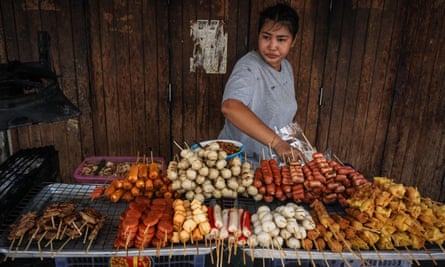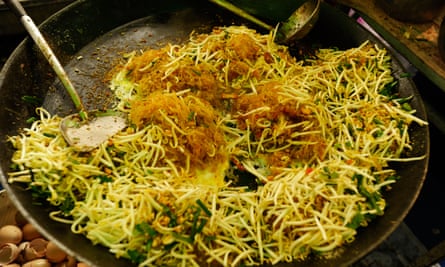Authorities in Bangkok have banned street food from the capital’s major roads, causing an outcry in a city famous for its affordable roadside cuisine.
In a move criticised by locals and culinary enthusiasts, thousands of vendors selling dishes such as spicy prawn soup and papaya salad will disappear by the end of the year in the interests of “order and hygiene”, according to city hall.
Wanlop Suwandee, chief adviser to Bangkok’s governor, said officials are “now working to get rid of stalls from all 50 districts of Bangkok” and return the pavements to pedestrians.
“There will be no let-up in this operation. Every street vendor will have to move out,” he said in comments reported by the local Nation news portal.
For decades Bangkok, the most visited city in the world, has promoted itself as a key destination for the food-obsessed. Locals and foreigners dine on plastic chairs at folding tables, slurping steaming noodles at street food eateries that stay open until dawn.
Roadsides clog up daily as workers rush to buy pineapple slices, fried chicken or sweet pork kebabs. Tourism, which makes up an estimated 15% of the economy, is buoyed by hundreds of street food tours through the subtropical city.
For the second year running, CNN this month named Bangkok as the city with the best street food on the planet.
However, since seizing power in 2014, Thailand’s junta has led a campaign to “clean up” and “return happiness” to the country, focusing on issues such as late night drinking, corruption and the sex trade.
Chawadee Nualkhair, a Bangkok-based street food blogger, said authorities’ previous attempts to remove stalls had failed.
“Street food was still too popular with the locals,” she said. “Of course, it would make Bangkok less charming. But it also takes a big chunk of cheap options away from working Thais, and closes up an avenue of work for many. Where will shop employees, construction workers and taxi drivers eat?”
When the Guardian interviewed diners at one stall, a woman eating catfish and steamed rice declined to comment as she said she worked for the Bangkok Metropolitan Administration, the agency implementing the ban.

Some of the city’s most acclaimed street food hotspots have been dismantled by developers who have bought land and evicted vendors.
Last year, the renowned Soi Sukhumvit 38 food market, which had operated for nearly 40 years, was destroyed to make way for a high-priced condominium. Some of the vendors selling pad thai and mango sticky rice were allowed to set up in the basement of a nearby building. Others selling egg noodles with BBQ pork and crab still squat in the area.
City hall says the central district of Siam has been cleared by police and that Chinatown’s Yaowarat Road and the backpacker haunt, the Khao San Road, made famous in the novel The Beach, are next on the list.
Along the busy streets of Thong Lor and Ekkamai, notices were warning vendors that the deadline to leave the area was 1 June. But it was brought forward to Monday 16 April, after the traditional New Year holiday.
Along Thong Lor on Tuesday, almost all the street vendors had left. Next to the spot where a popular chicken broth stall was based, a new sign says permits to trade have been revoked.
Bangkok food tour after the street stall ban. My favourite chicken noodle soup spot: pic.twitter.com/Lb7jP07oIl
— Oliver Holmes (@olireports) April 18, 2017
One vendor, a 61-year-old woman selling coconut and pumpkin sweets, said she was allowed to remain as she rented space in front of a pharmacy for about £5 a day, rather than using public space.
“There is nothing I can do,” said the woman, who called herself Aunty Tao and said she had worked there for three decades. She added that for years, law enforcement had often confiscated equipment from unlicensed vendors and fined them up to £35.

There has been confusion about how the policy will be implemented. The area’s district chief, Boontham Huiprasert, said push-cart vendors who could move around would still be tolerated but larger semi-permanent stalls with seating would have to go.
“Or if they can find a place to set up their shop without obstructing the sidewalk, such as behind the railing of the Thong Lor police station or some other private building, that would be OK too,” he said.
Additional reporting by Phakarat Ryn Jirenuwat
